
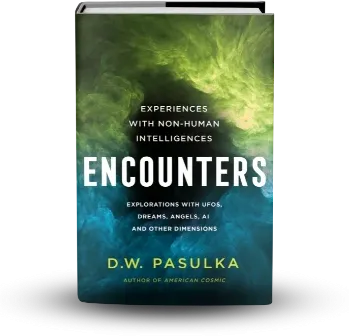
Encounters: Experiences with Nonhuman Intelligence
St. Martin’s Essentials. New York: November, 2023
A revolution is underway. For the first time in human history, we are at the cusp of experiencing contact with nonhuman life-forms of all kinds due to technological innovations and research into the experiences of people at the forefront of this development.
In Encounters, author D.W. Pasulka takes readers to the forefront of this revolution, sharing the work of experts across a spectrum of fields who are working to connect humanity with unknown life-forms.
Most of us have visions of nonhuman encounters that are shaped far more by Hollywood than they are informed by the current research. Encounters rewrites our visions of nonhuman species by featuring the work and stories of contemporary innovators who are rethinking our most basic assumptions about life and its manifestations beyond our experience.
The author of American Cosmic, D.W. Pasulka is a professor of religion at UNC, Wilmington; her work as a scholar has given her the tools to systematically examine data that exceeds rational categories―exactly the skillset needed to parse the world of UFOs, angels, AI, dreams, and other dimensions, which exist at the edges of human understanding. Encounters is a riveting exploration of the leading science of nonhuman life and a bold glimpse of the future of humanity in a universe where we are far from alone.
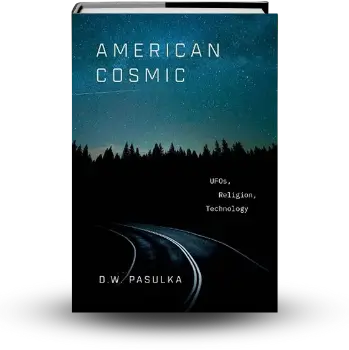
American Cosmic: UFOs, Religion, Technology
Oxford University Press. New York: February 2019
More than half of American adults and more than seventy-five percent of young Americans believe in intelligent extraterrestrial life. This level of belief rivals that of belief in God. American Cosmic examines the mechanisms at work behind the thriving belief system in extraterrestrial life, a system that is changing and even supplanting traditional religions.
Over the course of a six-year ethnographic study, D.W. Pasulka interviewed successful and influential scientists, professionals, and Silicon Valley entrepreneurs who believe in extraterrestrial intelligence, thereby disproving the common misconception that only fringe members of society believe in UFOs. She argues that widespread belief in aliens is due to a number of factors including their ubiquity in modern media like The X-Files, which can influence memory, and the believability lent to that media by the search for planets that might support life. American Cosmic explores the intriguing question of how people interpret unexplainable experiences, and argues that the media is replacing religion as a cultural authority that offers believers answers about non-human intelligent life.
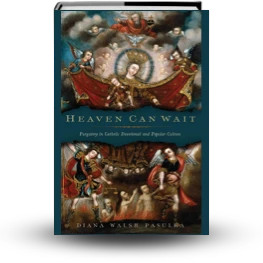
Heaven Can Wait: Purgatory in Catholic Devotional and Popular Culture
New York: Oxford University Press, 2014
After purgatory was officially defined by the Catholic Church in the thirteenth century, its location became a topic of heated debate and philosophical speculation: Was purgatory located on the earth, or within it? Were its fires real or figurative?
Diana Walsh Pasulka offers a groundbreaking historical exploration of spatial and material concepts of purgatory, beginning with scholastic theologians William of Auvergne and Thomas Aquinas, who wrote about the location of purgatory and questioned whether its torments were physical or solely spiritual. In the same period, writers of devotional literature located purgatory within the earth, near hell, and even in Ireland. In the early modern era, a counter-movement of theologians downplayed purgatory’s spatial dimensions, preferring to depict it in abstract terms–a view strengthened during the French Enlightenment, when references to purgatory as a terrestrial location or a place of real fire were ridiculed by anti-Catholic polemicists and discouraged by the Church.
The debate surrounding purgatory’s materiality has never ended: even today members of post-millennial ”purgatory apostolates” maintain that purgatory is an actual, physical place. Heaven Can Wait provides crucial insight into the theological problem of purgatory’s materiality (or lack thereof) over the past seven hundred years.
Co-edited Anthologies
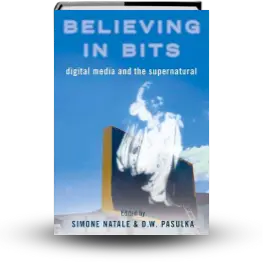
Digital Media and the Supernatural
Edited by Diana Walsh Pasulka and Simone Natale. Forthcoming with Oxford University Press, 2018
Believing in Bits advances the idea that religious beliefs and practices have become inextricably linked to the functioning of digital media. How did we come to associate things such as mindreading and spirit communications with the functioning of digital technologies? How does the internetâs capacity to facilitate the proliferation of beliefs blur the boundaries between what is considered fiction and fact? Addressing these and similar questions, the volume challenges and redefines established understandings of digital media and culture by employing the notions of belief, religion, and the supernatural.
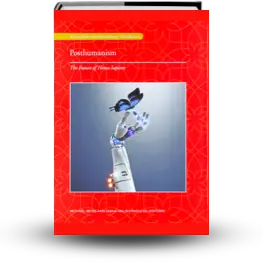
Posthumanism: The Future of Homo Sapiens
Co-edited with Michael Bess. Macmillan Interdisciplinary Handbooks: Farmington Hills, MI: Macmillan Reference USA. January 2018
Posthumanism: The Future of Homo Sapiens will provide an introduction to a vast array of scholarly perspectives on emergent technologies and biotechnologies used to modify or augment the capabilities of human beings. The handbook covers the fundamental aspects of how bioenhancement will become feasible, what shape these technologies are likely to take, and what sorts of concrete consequences they will have for people’s lives. This volume strives for both intellectual clarity and a genuinely accessible voice, always emphasizing the practical and moral implications of bioenhancement technologies. Posthumanism takes an interdisciplinary approach to the subject, integrating science and technology as well as the arts, humanities, religious perspectives, and ethics.
